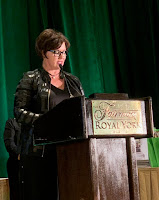Misconceptions about Farming from a Farmers perspective.
 |
| Canola Farm in Alberta |
We listened to scientists studying farming, there was a cooking demo from a popular Toronto Chef Trevor Lui, and Jeannette Andrashewski, a Farmer in Alberta speaking directly from her Canola Fields.
I met Jeannette Andrashewski, at a Canola Eat Well cooking event in 2016.
| Jeannette Andrashewski and Joey Salmingo at Canola Eat Well Event 2016. |
I have heard bits of her story at a few events over the years.
This past week she talked about how hard it was when her and her husband started their farm and it was very emotional for everyone to hear her story.
The next day I decided to watch a movie called Percy streaming on demand and I did a quick post on Instagram and tagged her. She quickly messaged me that the film was filled with many misconceptions and wanted me to be aware that she didn’t want to be connected to those misconceptions.
I messaged her back and we have had an online conversation about the challenges and I would like to present to you the farmer's view of farming and the misconceptions in the media about what farmers do.
The first misconception shown in the film is what Jeannette first addressed on how you can’t get a field of canola planted from a truck that passes by and drops some seeds. She says Canola requires much care during planting.
She worries about pesticides spreading just as much as we all do and how they are used but she insists the sprayers that are used today are so exact and precise and it goes on as a fine mist.
One of the facts she told me was that approximately 4,200 litres of water is mixed with 30 litres of herbicide. She says that farmers respect the water and nature and know where the water is so they try to stay away from it. They want natural habitats to stay undisturbed and to keep in its natural state
Unsafe practices can be reported by anyone, a person driving down the road, a landowner or anyone else. Farmers don’t want to be on the wrong side of protection groups and they want to do the right thing in their farming practices. This keeps the land healthy, sustainable and available for the next generation of farmers like her son.
And the obvious of a big machine trying to drive close to water will get stuck in it, let that visual sink in. That’s not exactly helpful or productive to drag equipment out of the mud.
I asked Jeannette what keeps farmers up at night. She said it was consumers having misinformation about the tools like pesticides farmers need to grow healthy crops as well as Environmental groups spreading misinformation and trying to take away all pesticides and herbicides because that would take away their ability to grow their crops.
Jeannette tells me that they plant other crops other than Canola because they practice the sustainable practice of crop rotation so after each harvest they rotate to a different crop to keep the soil regenerating and protecting their land.
A bit more about Jeannette’s farm. Her family began to take over the family farm full time in 2002 but they began part time in 1990 while keeping their full time jobs to make sure they were doing the right thing. Their farm is located at Two Hill, Alberta. North East of Edmonton. They are third generation farmers.
When I asked her about corporate farms she stated that 92% of farmland is owned by farming families and not big farm corporations and she felt that this was another media misconception.
Their biggest concern is always the weather. It’s a constant struggle to be a step ahead of the constantly changing Canadian weather but she says they have a lot of technology that helps them handle the constant weather changing events. Without the innovation of seed and technologies farming would be much more costly and difficult.
It is in their best interest to practice safe sustainable practices to grow food. She is growing it for her own family. She says “if you take care of the land the land will take care of you”.
She wants you to look into the facts after you watch a Hollywood production of what farming life is like. Hollywood movies have to embellish to create drama because the reality would be too boring to watch.
I have met a lot of farmers on the farm tours over the past few years and she says we should ask a farmer for the truth on how the food is grown. They do the work and know what the risks are and how it affects their livelihoods.
They work, live and play on the land and respect it as their own life.
Jeannette is a mother that wants safe, nutritious and abundant food to feed her family too.
My suggestion is to watch documentaries, get more facts. Go on farm tours once more farms are open to the public and meet some actual farmers. Go to Farmer’s markets where the farm family runs the stands so you can get to know them. They work extremely hard for everyone and could use a little gratitude for all of their hard work and investment.
 |
| Jeannette presenting at the Taste Canada Awards |
You can also find lots of information and recipes on the Canola Eat Well Website:

No comments:
Post a Comment
If you post Spam links in this comments section they will be deleted.